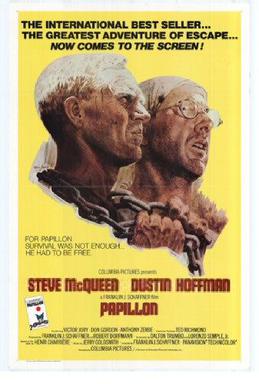I think it's a ridiculous claim for all three stars, especially McQueen. When I've talked to people who think he wasn't much of an actor -- more of a presence than anything -- the first movie I usually bring up is 1973's Papillon (with The Sand Pebbles close behind). Based on the real-life exploits of Henri Charriere, the deeply brooding, incredibly dark movie gives McQueen a chance to get deep into his own personal demons in a performance that you can't take your eyes off of. There are extended scenes and sequences that could serve as an example of how to dominate a movie doing very little at all. It is by no means an easy movie to sit through, one that makes you incredibly uncomfortable at times, but one worth watching.
Convicted in a French court for the murder of a pimp, Frenchman Henri Charriere (McQueen) is sentenced to life in prison in the French Guiana prison system in South America, a notorious system where diseases, horrific conditions, sadistic guards, and a short life expectancy await him. Aboard the ship bound for the prison, Henri -- known as Papillon because of the butterfly tattoo on his chest -- meets Louis Dega (Dustin Hoffman), a fellow Frenchman and an infamous forger responsible for thousands of families losing their life savings. For a price, Papillon offers to serve as Dega's bodyguard because the little forger is a target for his money. The two form an unlikely friendship as they near French Guiana, but no matter what awaits them, Papillon -- still claiming his innocence -- has no intention of staying long. Escape is on his mind, and no matter what the system does to him, he intends to make it out.
Charriere's autobiography is an extremely difficult book to read (I've tried twice and gotten no further than 100 pages) so formerly blacklisted screenwriter Dalton Trumbo has his work cut out for him. With a movie that clocks in at 151 minutes, his screenplay gets a chance to breathe. It is still at times a frustrating movie because not everything is spelled out for us as viewers. There are jumps in story, characters drift in and out, and over a decade has to be covered in the two and a half hours. But it's all part of the package here with a finished movie that leaves you wanting more. It is an eerily beautiful movie through all its depictions of what the human body and mind can survive when pushed to its absolute limit.
Up to this point in his career, McQueen had made a name for himself by playing the loner, the rebel, the anti-hero so it isn't a stretch for him to play a convicted murderer desperately trying to escape prison. But that's too simplistic a description because this performance is so much more. Charriere is a French safecracker who acquired a reputation in the Paris underworld as a man who could be trusted. As he prepares for this new phase in his life though, he not only looks ahead in preparation for awaits him but what he's leaving behind. Two quick dream sequences -- incredibly moody, unsettling scenes -- show a man who regrets how he got to this point, including one perfect line reading when a court says he's been found guilty of a wasted life. Watch it HERE. McQueen's face drops, knowing the statement is true, and says softly 'Guilty.'
While his whole performance is worth watching and recommending over and over again, one specific scene comes to mind. Captured after a failed escape attempt, Papillon is sentenced to two years in solitary confinement. Watch part of it HERE. From 5:25 on, watch a true actor do his job as good as humanly possible. In a cell about four feet across and eight feet long, there is nothing to distract from McQueen in the scene. This is a man at his absolute lowest who just won't give up, won't stop trying to survive when it would be so much easier to just lie down and stop. We're watching a man slowly losing his mind, slowly disintegrating right in front of us, and it is tragic to witness it. As good as McQueen was in The Sand Pebbles, I don't know if he was ever stronger than he was right there in that solitary cell in Papillon.
So McQueen's great, and that's it, right? Not so fast. In a role that could have been easy for him to get tossed aside, Dustin Hoffman delivers a subtle, very moving part as Louis Dega, the smallish in stature but incredibly intelligent forger who becomes friends with Papillon. Hoffman was on his way to being one of Hollywood's strongest, most gifted actors, and this part is definitely one that allows him to show off his many talents. As for the rest of the cast, Don Gordon, Anthony Zerbe, Woodrow Parfrey, and Robert Deman all impress too with smaller parts. I also have to mention Jerry Goldsmith's musical score, especially the main theme (listen HERE), one of the composer's all-time best scores.
Papillon <---trailer (1973): ****/****



No comments:
Post a Comment